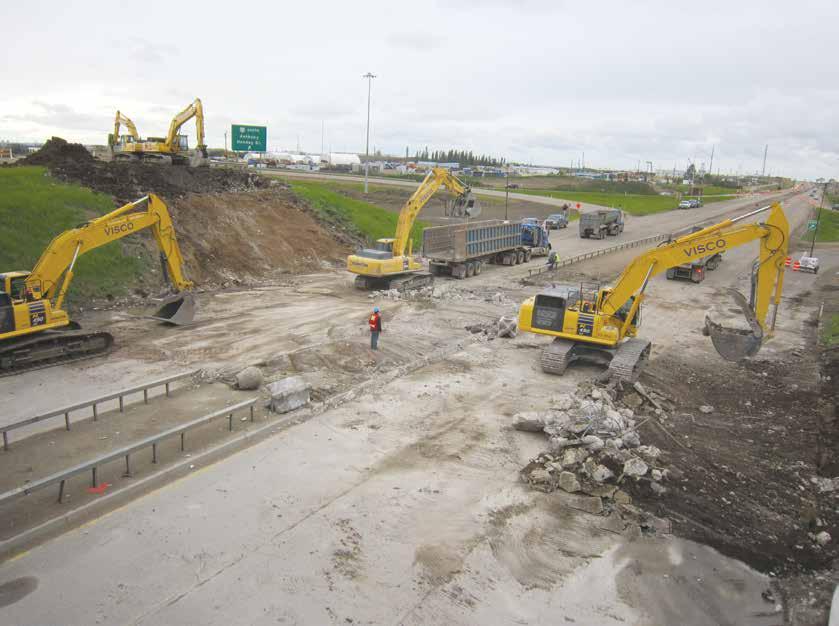
2 minute read
EDMONTON REGION’S CONSTRUCTION SECTOR IS BUILDING A LOWCARBON ECONOMY
The Edmonton Metropolitan Region is at the forefront of significant global opportunities in global food security, logistics, life sciences, artificial intelligence, and the clean technology that’s paving the way to Canada’s netzero future—hydrogen. Our construction sector is a big part of why these worldscale opportunities are within our reach.
The Edmonton region contributes to more than 30 per cent of Alberta’s
Advertisement
GDP—and it is rapidly growing. It is the fifth-largest and second-fastest-growing major metropolitan area in Canada.
“We are becoming globally recognized for our capability and capacity for bringing these opportunities from earlystage concepts to world-class facilities,” said Malcolm Bruce, Edmonton Global CEO. “The construction industry is present in every sector in the Edmonton region, and our talent pool has proven time and time again that the Edmonton region is ready to meet these increased industry demands.”
CANADA’S PATH TO NET-ZERO RUNS THROUGH THE EDMONTON REGION
As Canada transitions to a low-carbon economy, all of our futures are linked. That’s why key partners in the Edmonton region are working cooperatively to take advantage of the $11-trillion global hydrogen opportunity for Canada. This consortium of partners, known as the Edmonton Region Hydrogen HUB, is accelerating the growth of Canada’s emerging hydrogen economy.


Alberta already produces over 60 per cent of Canada’s hydrogen, with most of that coming from the Edmonton region— and we’ve been doing it for decades. This, combined with the Edmonton region’s expertise in Carbon Capture, Utilization, and Storage (CCUS), is attracting significant investment.

“Diversifying Canada’s energy portfolio is key to a prosperous economic future, one that creates good paying careers, and helps us achieve our 2050 net-zero goals,” said the Honourable Randy Boissonnault, Minister of Tourism and Associate Minister of Finance, at the Canadian Hydrogen Convention during Air Products’ announcement to build a hydrogen fueling station in Edmonton.
Investments into the region’s hydrogen economy will have a profound economic impact on Canada and trigger considerable demand in the construction industry. For example, hydrogen is ideal for refining oil; producing petrochemicals and fertilizers; as a transportation fuel for long-haul trucking, heavy machinery, and buses; and in highheat manufacturing of materials like glass, concrete, and steel – areas that are looking at hydrogen and CCUS to decarbonize operations and meet emission-reduction targets.

As a result, the construction industry is experiencing an exciting time of growth and innovation as new projects come online.
AIR PRODUCTS’ NET-ZERO HYDROGEN FACILITY AND FUELLING STATION
During this year’s Canadian Hydrogen Convention, the largest hydrogen event in North America and hosted in the Edmonton region, Air Products announced plans to construct the largest hydrogen fueling station in the world in the Edmonton region. The hydrogen refueling station will be the company’s first in Canada and will complement its net-zero hydrogen facility currently being built. That facility is a $1.6 billion project and is creating 2,500 construction and engineering jobs.
When it becomes operational in 2024, Air Products’ complex is anticipated to contribute over $809 million to the regional GDP and stimulate growth in distribution, manufacturing, and transportation as hydrogen fuel becomes more readily available to heavy-emitting sectors.
DOW CHEMICAL NET-ZERO ETHYLENE AND DERIVATIVES COMPLEX

Last year, Dow announced plans for its proposed net-zero complex, which will be the world’s first net-zero ethylene plant that uses low-carbon hydrogen to make ethylene without emitting greenhouse gases. This massive $10 billion project is expected to decarbonize 30 per cent of Dow’s global footprint and generate more than 7,000 construction jobs. Dow anticipates making its final investment decision on this project in Q4 of 2023.
For example, hydrogen is ideal for refining oil; producing petrochemicals and fertilizers; as a transportation fuel for long-haul trucking, heavy machinery, and buses; and in highheat manufacturing of materials like glass, concrete, and steel – areas that are looking at hydrogen and CCUS to decarbonize operations and meet emission-reduction targets.

More recently, Dow announced its preferred partner for the complex at the










